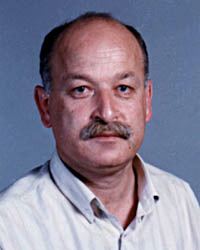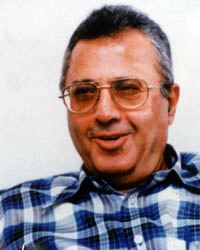 |
| Vol. 2 No. 10 | Table of Contents MEIB Main Page | November 2000 |
 |
| Elias Atallah |
Steadily growing public dissent against Syrian authority has begun filtering throughout the sectarian and ideological spectrum of Lebanese politics in recent months. Perhaps the most striking indication of this trend is the emergence of a dissident faction of the Lebanese Communist Party (LCP), led by Elias Atallah, calling for the restoration of Lebanese sovereignty and a "reappraisal" of ties with Syria.
Background
The LCP was founded in October 1924 by Farjallah al-Helou (from the town of Hisrayil in the mountains overlooking the city of Byblos) and Ncoula al-Shawi (from the port area in the city of Tripoli) in close coordination with the Syrian Communist Party. The two branches remained part of the same organization until Lebanon's independence in 1943 and reunited again in 1946, only to be separated finally in 1958, when Syria and Egypt declared their union under the United Arab Republic (1958-1961). Lebanese communists who opposed this union were harshly persecuted by the Syrian government--Helou, in fact, was detained and tortured to death with acid in Syria's infamous Mezze prison. After the UAR dissolved in 1961, the Syrian Communist Party was led by Khalid Bekdash and eventually joined with several other socialist and Arab nationalist groups in the ceremonial "National Front" established by the late Syrian president Hafez Assad.
The LCP was legalized in 1969 and Shawi remained at the helm until his death in 1976. After the onset of the Lebanese civil war in 1975, the LCP joined the leftist National Movement headed by the late Kamal Jumblatt, which sought to overthrow the Lebanese Republic and forcibly opposed the entry of Syrian forces into Lebanon.
Despite the chaotic political climate in Lebanon, the LCP flourished over the years, exerting a tremendous influence on labor unions, universities and in the fields of music and literature. It established several publishing houses, including Dar al-Farabi and Dar al-Fikr-al-Jadid, and began publishing popular daily and weekly publications such as Al-Nidaa and Al-Akhbar. It also acquired a radio station, Sawt al-Sha'ab (Voice of the People), and ran the NTV television station for several years before selling it to Tahseen Khayyat, a multi-millionaire opposed to Rafiq Hariri.
Over the last decade, however, the LCP has declined as a political force in Lebanon. The rise of Islamic fundamentalism, the fall of the Soviet Union, and the failure of the LCP to transform itself into a more open and democratic socialist party (along the lines of what happened in Italy and many Eastern European countries) were significant factors contributing to this decline. Under the Syrian occupation, the party's leadership became co-opted by Damascus, which sought to eliminate any independent political activity by Lebanese leftists.
Internal Dissent
Over the last decade, the LCP rank and file have become increasingly disillusioned with the party leadership, which is seen as thoroughly subservient to Damascus and unable to undertake independent political initiatives. Many members of the LCP interviewed for this article said that the atmosphere created by the Syrian occupation made it impossible for the party to have even a modest comeback.
Internal dissent within the LCP erupted into the open shortly after the recent parliamentary elections with the publication of an open letter, excerpts of which were published in the Lebanese press on September 13, calling on the party's leadership to resign because it has failed miserably "to fulfill the party's national and democratic role" and is leading the party into political oblivion. The letter, signed by members who called themselves "the reform and democracy forces in the Lebanese Communist Party" (RDF), said that the LCP is facing a critical situation and that a revolutionary step is needed "to restore the faith of all the leftists, democrats and seculars in the party." The demands and complaints raised in the letter include the following:
 |
| Farouq Dahrouj |
Among the activists who signed the letter were politburo members Nadim Abdel Samad, Shafiq Sheaib, Adib Nehmeh, Sanaa Abou-Shaqra, and Tanious Deaibes, along with two members from the LCP's National Council, Elias Atallah and Muhammad Ali Mkallid. Others included Khalil Rihan, the party's leader in the Nabatieh district; Ahmad Mrad and Bassam Salih, party leaders in south Lebanon; Nasr Farah, Bashar Krayyem and Joseph Houly, party leaders from north Lebanon.
Party sources and press reports revealed that the main leader of the RDF faction is Elias Atallah, who for eighteen years led the "Lebanese National Resistance" against Israel in South Lebanon alongside Hezbollah. Atallah was credited with supervising a great number of operations including the attempted assassination of South Lebanon Army (SLA) commander Antoine Lahad (who was seriously injured) by Suha Beshara and daring suicide attacks like the one carried out by George Nasrallah in Jabal al-Shaykh in 1988. Atallah and other RDF members have privately accused Syria of obstructing the resistance activities of the LCP against Israel in South Lebanon while facilitating those of Hezbollah.
MEIB has learned that the RDF has the implicit support of George Hawi, who was the secretary-general of the LCP in the war years and who until last month was the head of the LCP's National Council. Several regional organizations came out in support of the RDF when Farouq Dahrouj expelled Atallah from the party on September 26.
� 2000 Middle East Intelligence Bulletin. All rights reserved.